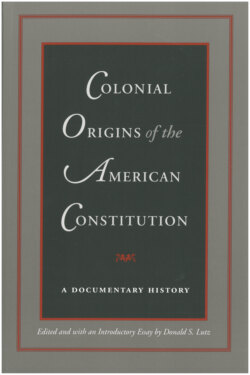Читать книгу Colonial Origins of the American Constitution - Группа авторов - Страница 15
На сайте Литреса книга снята с продажи.
Оглавление8
[Massachusetts Election Agreement]
May 18, 1631
Although elections had been held in a number of colonies prior to this date, the Massachusetts Election Agreement is probably the oldest formal colonial provision defining an election process. The “commons” referred to here included all freemen, as clarified by an agreement on May 9, 1632. A “freeman” was one who held town privileges, one of which was the right to live in that town. A “freeholder,” on the other hand, was a freeman who owned a certain amount of land, usually forty or fifty acres. The use of “freeman,” therefore, essentially included all adult males in elections, without any property holding requirement, and established popular sovereignty, representation, political equality, and majority rule.
Taken from E. S. Morgan, ed., The Founding of Massachusetts: The Historians and Their Sources (Indianapolis: The Bobbs-Merrill Company, 1964), 406. The spelling is Morgan’s.
For explanation of an order made the last general court, held the 19th of October last, it was ordered now, with full consent of all the commons then present, that once in every year, at least, a general court shall be held, at which court it shall be lawful for the commons to propound any person or persons whom they shall desire to be chosen assistants, and if it be doubtful whether it be the greater part of the commons or not, it shall be put to the poll. The like course to be held when they, the said commons, shall see cause for any defect or misbehavior to remove any one or more of the assistants. And to the end the body of the commons may be preserved of honest and good men, it was likewise ordered and agreed that for time to come no man shall be admitted to the freedom of this body politic but such as are members of some of the churches within the limits of the same.
